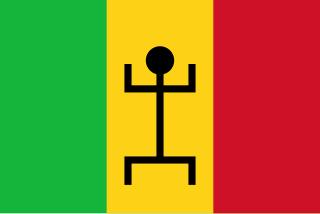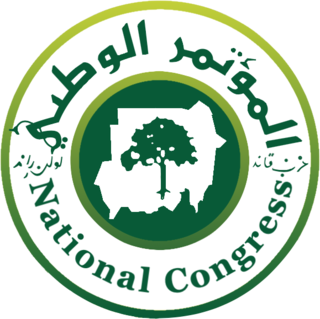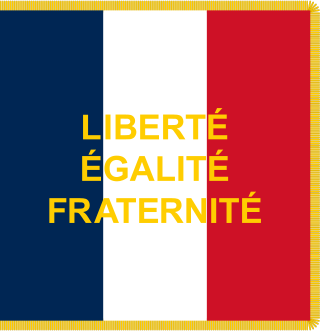Chad, officially the Republic of Chad, is a landlocked country in Central Africa. It borders Libya to the north, Sudan to the east, the Central African Republic to the south, Cameroon and Nigeria to the southwest, and Niger to the west. Due to its distance from the sea and its largely desert climate, the country is sometimes referred to as the "Dead Heart of Africa".

Sudan, officially the Republic of the Sudan, is a country in Northeast Africa. It borders the Central African Republic to the southwest, Chad to the west, Egypt to the north, Eritrea to the northeast, Ethiopia to the southeast, Libya to the northwest, South Sudan to the south, and the Red Sea. It has a population of 45.7 million people as of 2022 and occupies 1,886,068 square kilometres, making it Africa's third-largest country by area and the third-largest by area in the Arab League. It was the largest country by area in Africa and the Arab League until the secession of South Sudan in 2011; since then both titles have been held by Algeria. Its capital city is Khartoum, and its most populous city is Omdurman.

Currently, the politics of Sudan takes place in the framework of a federal provisional government. Previously, a president was head of state, head of government, and commander-in-chief of the Sudanese Armed Forces in a de jure multi-party system. Legislative power was officially vested in both the government and in the two chambers, the National Assembly (lower) and the Council of States (higher), of the bicameral National Legislature. The judiciary is independent and obtained by the Constitutional Court. However, following a deadly civil war and the still ongoing genocide in Darfur, Sudan was widely recognized as a totalitarian state where all effective political power was held by President Omar al-Bashir and his National Congress Party (NCP). However, al-Bashir and the NCP were ousted in a military coup which occurred on April 11, 2019. The government of Sudan was then led by the Transitional Military Council or TMC. On 20 August 2019, the TMC dissolved giving its authority over to the Sovereignty Council of Sudan, who were planned to govern for 39 months until 2022, in the process of transitioning to democracy. However, the Sovereignty Council and the Sudanese government were dissolved in October 2021.

French Sudan was a French colonial territory in the Federation of French West Africa from around 1880 until 1959, when it joined the Mali Federation, and then in 1960, when it became the independent state of Mali. The colony was formally called French Sudan from 1890 until 1899 and then again from 1921 until 1958, and had a variety of different names over the course of its existence. The colony was initially established largely as a military project led by French troops, but in the mid-1890s it came under civilian administration.

Omar Hassan Ahmad al-Bashir is a Sudanese former military officer and politician who served as Sudan's head of state under various titles from 1989 until 2019, when he was deposed in a coup d'état. He was subsequently incarcerated, tried and convicted on multiple corruption charges. He came to power in 1989 when, as a brigadier general in the Sudanese Army, he led a group of officers in a military coup that ousted the democratically elected government of prime minister Sadiq al-Mahdi after it began negotiations with rebels in the south; he subsequently replaced President Ahmed al-Mirghani as head of state. He was elected three times as president in elections that have been under scrutiny for electoral fraud. In 1992, al-Bashir founded the National Congress Party, which remained the dominant political party in the country until 2019. In March 2009, al-Bashir became the first sitting head of state to be indicted by the International Criminal Court (ICC), for allegedly directing a campaign of mass killing, rape, and pillage against civilians in Darfur. On 11 February 2020, the Government of Sudan announced that it had agreed to hand over al-Bashir to the ICC for trial.

Gaafar Muhammad an-Nimeiry was a Sudanese politician who served as the fourth head of state of Sudan from 1969 to 1985, first as Chairman of the National Revolutionary Command Council and then as President.

Modibo Keïta was a Malian politician who served as the first President of Mali from 1960 to 1968. He espoused a form of African socialism. He was deposed in a coup d'état in 1968 by Moussa Traoré.

The Mali Federation was a federation in West Africa linking the French colonies of Senegal and the Sudanese Republic for two months in 1960. It was founded on 4 April 1959 as a territory with self-rule within the French Community and became independent after negotiations with France on 20 June 1960. Two months later, on 19 August 1960, the Sudanese Republic leaders in the Mali Federation mobilized the army, and Senegal leaders in the federation retaliated by mobilizing the gendarmerie ; this resulted in a tense stand-off, and led to the withdrawal from the federation by Senegal the next day. The Sudanese Republic officials resisted this dissolution, cut off diplomatic relations with Senegal, and defiantly changed the name of their country to Mali. For the brief existence of the Mali Federation, the premier was Modibo Keïta, who would later become the first President of Mali, and its government was based in Dakar, the eventual capital of Senegal.

The National Congress Party was a major political party that dominated domestic politics in Sudan from its foundation until the Sudanese Revolution.

The French Community was the constitutional organization set up in October 1958 between France and its remaining African colonies, then in the process of decolonization. It replaced the French Union, which had reorganized the colonial empire in 1946. While the Community remained formally in existence until 1995, when the French Parliament officially abolished it, it had effectively ceased to exist and function by the end of 1960, by which time all the African members had declared their independence and left it.

The Sudanese Regroupment Party was a political party in French Sudan led by Fily Dabo Sissoko. Politically it represented a conservative traditionalist position, and drew support from traditional chiefs and the colonial administration. It was founded in December 1945 by Sissoko, son of a canton chief, and Hamadoun Dicko, a former canton chief. The party sought gradual independence from France, seeking to preserve the influence of traditional elites.

The Chadian Civil War of 2005–2010 began on December 18, 2005. Since its independence from France in 1960, Chad has been swamped by civil wars between the Arab-Muslims of the north and the Sub-Saharan-Christians of the south. As a result, leadership and presidency in Chad drifted back and forth between the Christian southerners and Muslim northerners. When one side was in power, the other side usually started a revolutionary war to counter it.

The Sudanese Communist Party is a communist party in Sudan. Founded in 1946, it was a major force in Sudanese politics in the early post-independence years, and was one of the two most influential communist parties in the Arab world, the other being the Iraqi Communist Party.

Territorial Assembly elections were held in French Sudan on 31 March 1957, the first elections in the territory to be held under universal suffrage. The result was a victory for the Sudanese Union – African Democratic Rally. which won 57 of the 70 seats. Voter turnout was just 34.0%.

Territorial Assembly elections were held in French Sudan on March 30, 1952. The Sudanese Progressive Party remained the largest party, winning 28 of the 40 Second College seats. The Sudanese Union – African Democratic Rally won the remaining 13. seats

Elections to the French National Assembly were held in French Sudan on 10 November 1946 as part of the wider French parliamentary elections. Three members were elected, with the Sudanese Progressive Party winning two seats and the Sudanese Union – African Democratic Rally one.

Elections to the French National Assembly were held in French Sudan on 2 January 1956 as part of the wider French parliamentary elections. Four members were elected, with the Sudanese Progressive Party (PSS) and the Sudanese Union – African Democratic Rally (US–RDA) winning two each. Mamadou Konaté and Modibo Keïta were elected on the US–RDA list, whilst Fily Dabo Sissoko and Hamadoun Dicko were elected for the PSS.
A coup d'état took place in Sudan in the late afternoon on 11 April 2019, when President Omar al-Bashir was overthrown by the Sudanese Armed Forces after popular protests demanded his departure. At that time, the army, led by Ahmed Awad Ibn Auf, toppled the government and National Legislature and declared a state of emergency in the country for a period of 3 months, followed by a transitional period of two years before an agreement was reached later.

Abdel Fattah al-Burhan Abdelrahman al-Burhan is a Sudanese army general who is the de facto ruler of Sudan. Following the Sudanese Revolution in April 2019, he was handed control of the military junta, the Transitional Military Council, a day after it was formed, due to protesters' dissatisfaction with the establishment ties of initial leader Ahmed Awad Ibn Auf. He served as chairman of the TMC until a draft constitutional declaration signed with civilians went into effect in August 2019, and a collective head of state Transitional Sovereignty Council was formed, also to be initially headed by al-Burhan.

On 25 October 2021, the Sudanese military, led by General Abdel Fattah al-Burhan, took control of the Government of Sudan in a military coup. At least five senior government figures were initially detained. Civilian Prime Minister Abdalla Hamdok refused to declare support for the coup and on 25 October called for popular resistance; he was confined to house arrest on 26 October. Internet outages were reported. Later the same day, the Sovereignty Council was dissolved, a state of emergency was put in place, and a majority of the Hamdok Cabinet and a number of pro-government supporters were arrested. As of 5 November 2021, the list of those detained included "government ministers, members of political parties, lawyers, civil society activists, journalists, human rights defenders, and protest leaders", who were held in secret locations, without access to their families or lawyers.














